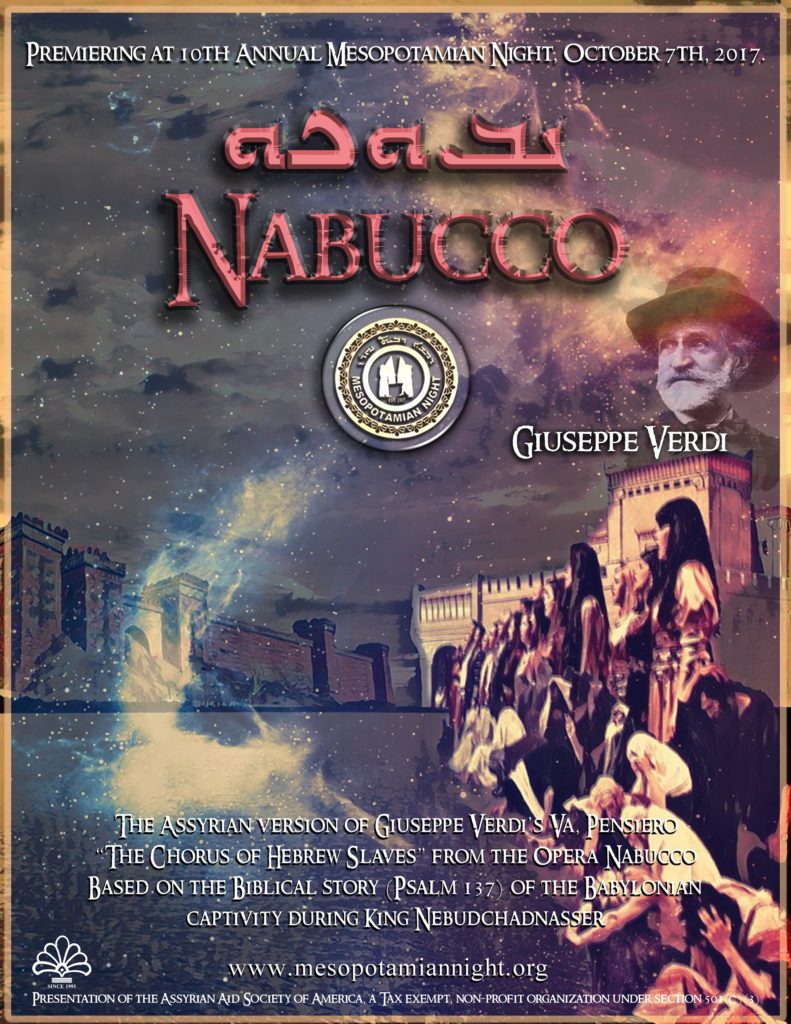The Mesopotamian Night project has made unique contributions to cultural and artistic progress. Each of our creations, from reviving the ancient epics of Inanna and Gilgamesh, to the other not well known stories such as Qateeni, Ninous-Shamiram, and Badri depict a unique aspect of Assyrian culture and arts. Premiering works such as the Little Lantern of a Palestinian writer as a modern ballet production, or the Sari Galin piece (mostly with Azari and Armenian roots) with an Assyrian taste, weaved our deep connection to other Middle Eastern cultures.
In the article below Dr. Eden Naby talks about our latest contribution: the Assyrian version of “The Chorus of Hebrew Slaves” from the opera Nabucco, connecting us to yet another important component of Middle Eastern cultures.

Flyer produced & designed by: Sargon Rameshk
Since 2003 we have watched with anguish the desperate situation of Assyrians in Iraq torn among political forces that barely tolerate them and those who only desire to possess their homes, farms and villages. Many people living in towns and villages located on the Nineveh Plain, did not experience the genocide of 100 years ago that devastated Tur Abdin, Urmiah & Salamas, and especially that unique set of tribal Assyrians in the Hakkari. Though several villages and families in northern Iraq sheltered fleeing surviving Assyrians, particularly from Hakkari, they themselves did not experience the deportation, murder and pillaging that other Assyrians did.
Since the 1960s, Iraq has become a cauldron of uncertainty for Assyrians in particular, as their numbers have reduced by legal maneuvers into church communities and punished severely for national identity. Iraq and most of the Middle East has not undergone lasting nationalism that regards those living within the borders of states as being equal citizens before the law. Iran and Turkey, for a few decades, held promise of being exceptions but the rise of radical Islam has snuffed out such merit based treatment of people. Yet the myth of being Iranian, Turkish, Syrian or Iraqi continues in international relations, often to the detriment of Assyrians and other unacknowledged minorities.
The rise of ISIS brought all these decades of oppression to the forefront as naked genocide of Assyrians and Yezidis unmasked the envy and hatred for non-Muslims simmering under the surface, even among neighbors.
Verdi, in composing the sublime music of Nabucco to a libretto based on ancient Biblical themes, nationalism is a living goal, even for the Jews. Nationalism is the movement that allowed Europe to leap politically ahead of the Russian, Chinese, and Ottoman empires. It was the time when Jewish rabbis and eventually Jewish intellectuals began advocating a national homeland for the Jews. This is the very basis of Psalm 137 and the “Chorus of the Hebrew Slaves.” How could they not be influenced by a concept repeated every week as part of both worship and home prayers? “By the rivers of Babylon, there we sat down, yea, we wept, when we remembered Zion…”
In a broad sense, the 137th psalm, inspired by remembrance of the Babylonian captivity a few centuries earlier, kept alive the memory and desire for Jerusalem, for a return to that legendary city. Had the Jews were not taken off into captivity by Nebuchadnezzar, they might have as well swept away by succeeding empires. In diaspora, their culture, based on religiously preserved rituals, kept alive a sense of identity, despite their adoption of other languages, as they adopted Aramaic for centuries after three generations of living among Aramaic speakers.
After the destruction of our ancient art so thoroughly by Islamic radicalism yet again, after the blowing up of our churches, do we long for Nineveh? Do we wait for an opportunity for an Aliyah of our own some day?
